2023年中考英语复习 7年级上册 Module 6~Module 10 课件(共44张PPT)
文档属性
| 名称 | 2023年中考英语复习 7年级上册 Module 6~Module 10 课件(共44张PPT) | 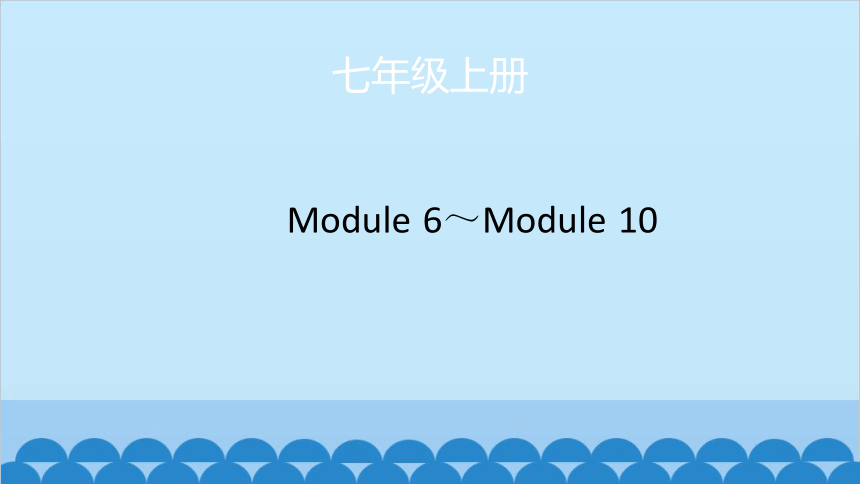 | |
| 格式 | pptx | ||
| 文件大小 | 133.8KB | ||
| 资源类型 | 教案 | ||
| 版本资源 | 外研版 | ||
| 科目 | 英语 | ||
| 更新时间 | 2023-06-10 22:05:50 | ||
图片预览

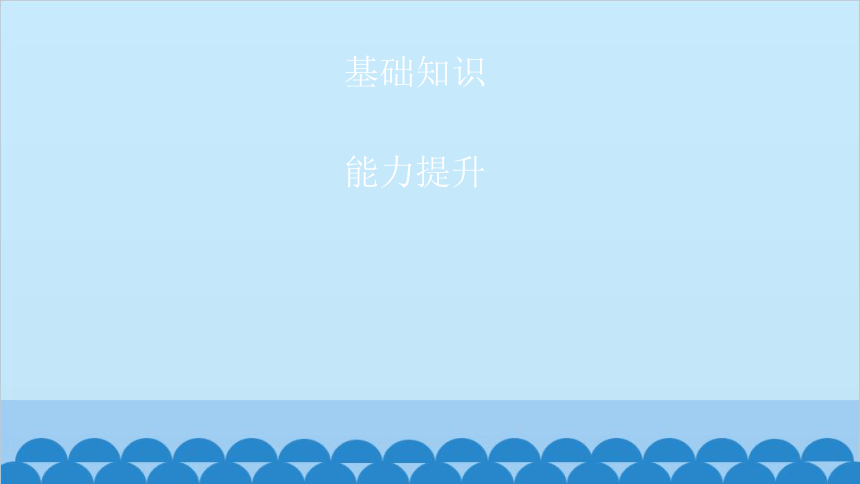
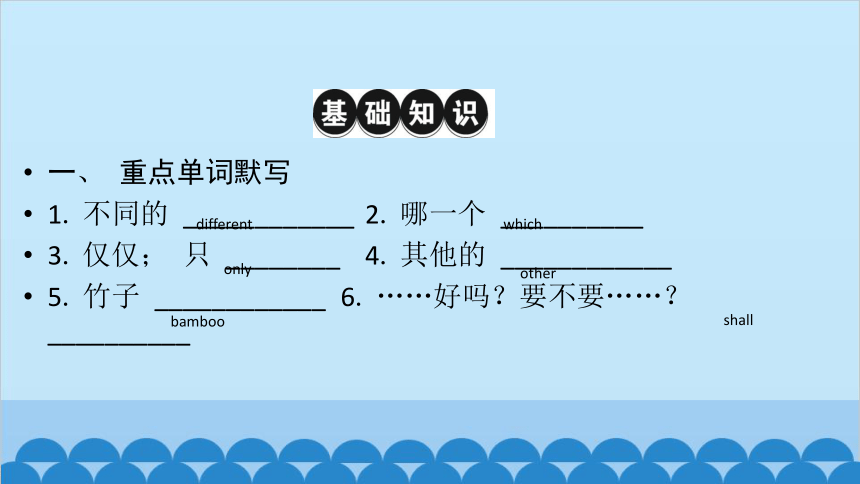
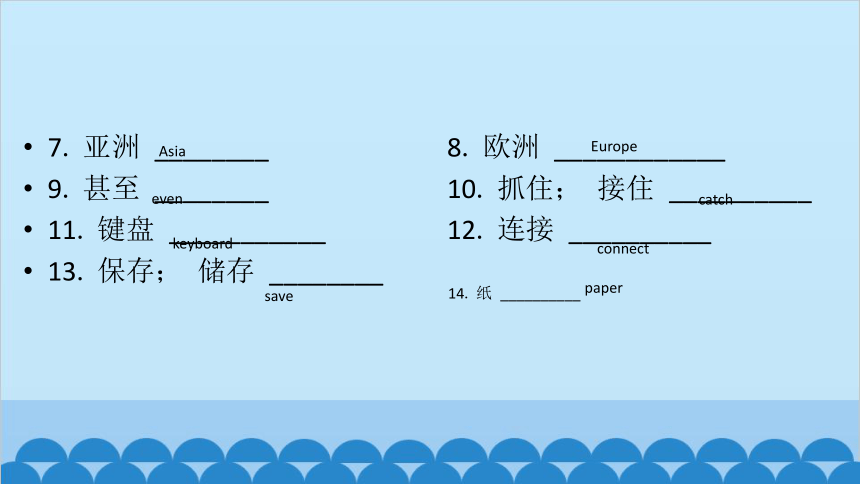
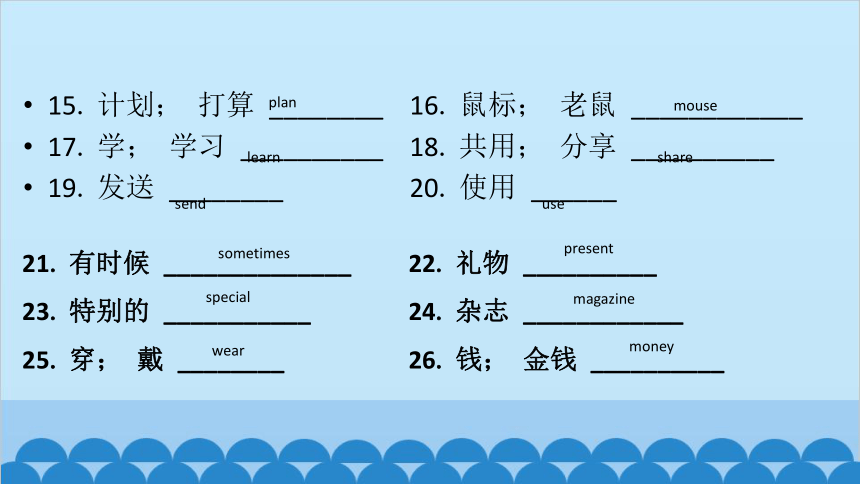
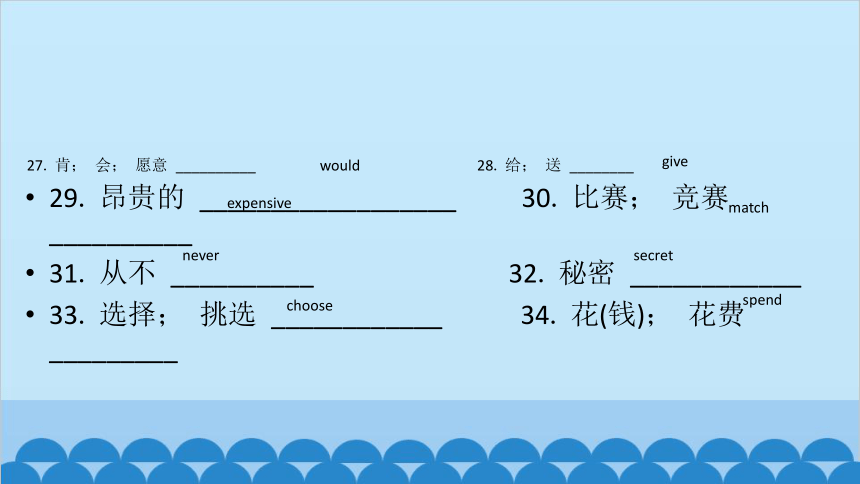
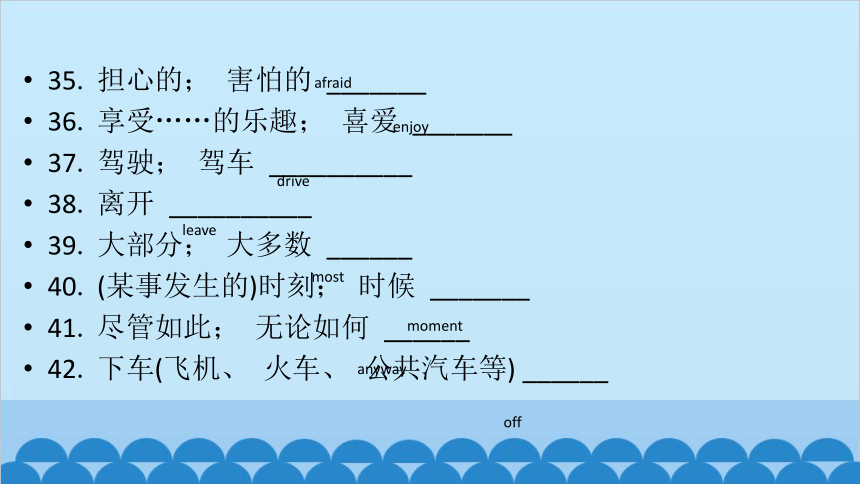
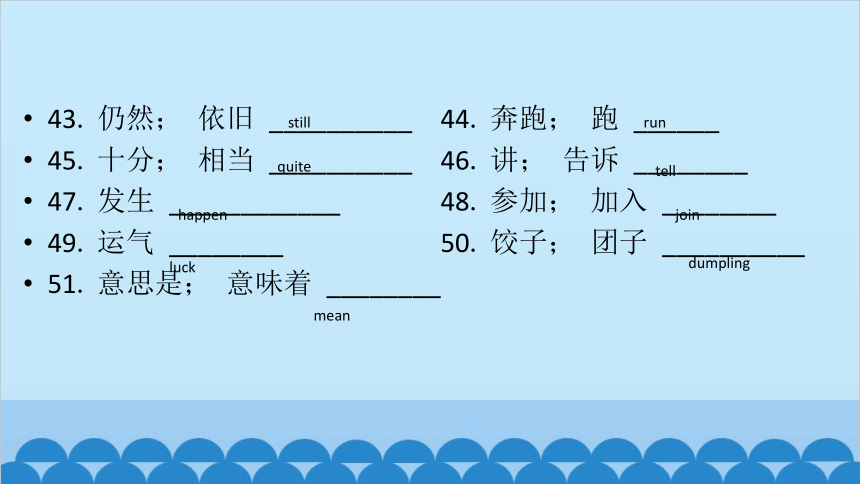
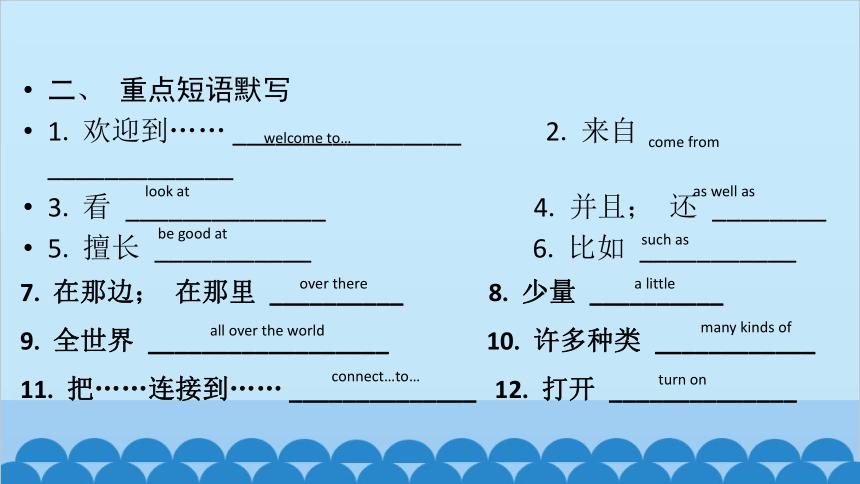
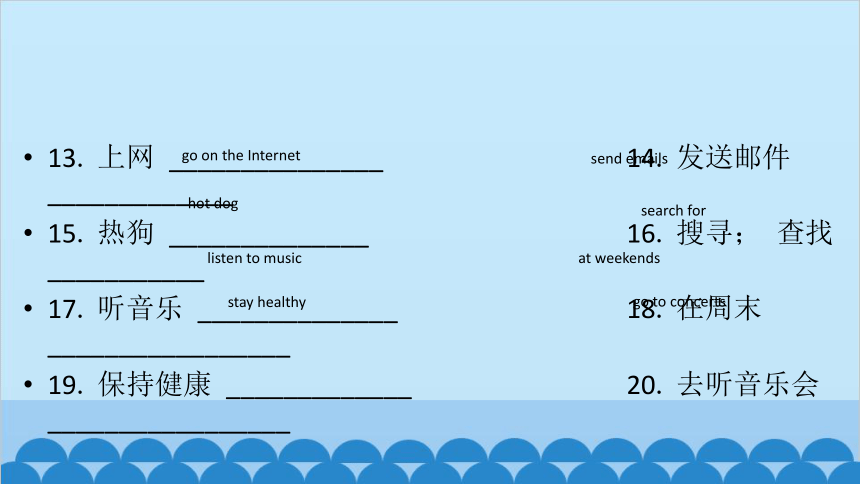
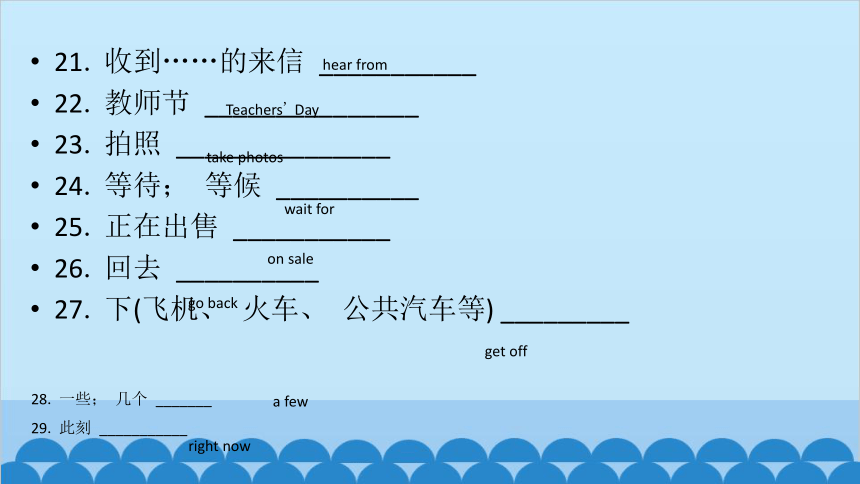
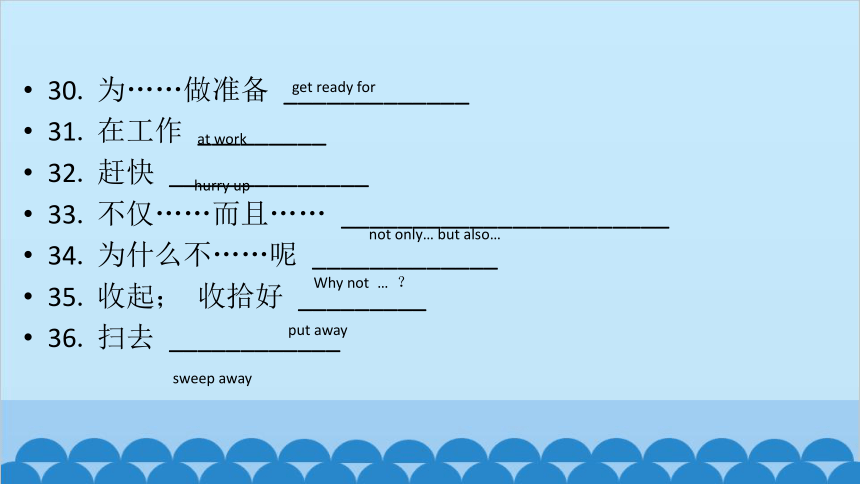
文档简介
(共37张PPT)
七年级上册
Module 6~Module 10
基础知识
能力提升
一、 重点单词默写
1. 不同的 ____________ 2. 哪一个 __________
3. 仅仅; 只 ________ 4. 其他的 ____________
5. 竹子 ____________ 6. ……好吗?要不要……? __________
different
which
only
other
bamboo
shall
7. 亚洲 ________ 8. 欧洲 ____________
9. 甚至 ________ 10. 抓住; 接住 __________
11. 键盘 ___________ 12. 连接 __________
13. 保存; 储存 ________
14. 纸 __________
Asia
Europe
even
catch
keyboard
connect
save
paper
15. 计划; 打算 ________ 16. 鼠标; 老鼠 ____________
17. 学; 学习 __________ 18. 共用; 分享 __________
19. 发送 ________ 20. 使用 ______
21. 有时候 ______________ 22. 礼物 __________
23. 特别的 ___________ 24. 杂志 ____________
25. 穿; 戴 ________ 26. 钱; 金钱 __________
plan
mouse
learn
share
send
use
sometimes
present
special
magazine
wear
money
29. 昂贵的 __________________ 30. 比赛; 竞赛 __________
31. 从不 __________ 32. 秘密 ____________
33. 选择; 挑选 ____________ 34. 花(钱); 花费 _________
27. 肯; 会; 愿意 __________
28. 给; 送 ________
would
give
expensive
match
never
secret
choose
spend
35. 担心的; 害怕的 _______
36. 享受……的乐趣; 喜爱 _______
37. 驾驶; 驾车 __________
38. 离开 __________
39. 大部分; 大多数 ______
40. (某事发生的)时刻; 时候 _______
41. 尽管如此; 无论如何 ______
42. 下车(飞机、 火车、 公共汽车等) ______
afraid
enjoy
drive
leave
most
moment
anyway
off
43. 仍然; 依旧 __________ 44. 奔跑; 跑 ______
45. 十分; 相当 __________ 46. 讲; 告诉 ________
47. 发生 ____________ 48. 参加; 加入 ________
49. 运气 ________ 50. 饺子; 团子 __________
51. 意思是; 意味着 ________
still
run
quite
tell
happen
join
luck
dumpling
mean
二、 重点短语默写
1. 欢迎到…… ________________ 2. 来自 _____________
3. 看 ______________ 4. 并且; 还 ________
5. 擅长 ___________ 6. 比如 ___________
7. 在那边; 在那里 __________ 8. 少量 __________
9. 全世界 __________________ 10. 许多种类 ____________
11. 把……连接到…… ______________ 12. 打开 ______________
welcome to…
come from
look at
as well as
be good at
such as
over there
a little
all over the world
many kinds of
connect…to…
turn on
13. 上网 _______________ 14. 发送邮件 _____________
15. 热狗 ______________ 16. 搜寻; 查找 ___________
17. 听音乐 ______________ 18. 在周末 _________________
19. 保持健康 _____________ 20. 去听音乐会 _________________
go on the Internet
send emails
hot dog
search for
listen to music
at weekends
stay healthy
go to concerts
21. 收到……的来信 ___________
22. 教师节 _______________
23. 拍照 _______________
24. 等待; 等候 __________
25. 正在出售 ___________
26. 回去 __________
27. 下(飞机、 火车、 公共汽车等) _________
28. 一些; 几个 _______
29. 此刻 ___________
hear from
Teachers' Day
take photos
wait for
on sale
go back
get off
a few
right now
30. 为……做准备 _____________
31. 在工作 _________
32. 赶快 ______________
33. 不仅……而且…… _______________________
34. 为什么不……呢 _____________
35. 收起; 收拾好 _________
36. 扫去 ____________
get ready for
at work
hurry up
not only… but also…
Why not … ?
put away
sweep away
三、 重点句子翻译
1. 狗不吃竹子。
____________________________________________________________
2. ——他经常跟他的祖母交谈吗? ——是的。
____________________________________________________________3. Tom总是和我们分享他的照片。
____________________________________________________________
Dogs don't eat bamboo.
—Does he often talk to his grandma? —Yes, he does.
Tom always shares his photos with us.
4. 你通常怎样挑选礼物?
____________________________________________________________5. 你想去参加明明的生日聚会吗?
____________________________________________________________6. 每年妈妈都会给我几本书。
____________________________________________________________
How do you usually choose presents?
Would you like to go to Mingming's birthday party?
Every year my mother gives some books to me/gives me some books.
7. 我花了10元买这支钢笔。
____________________________________________________________8. Mary喜欢听音乐会。
____________________________________________________________
9. 我妈妈经常给我买蛋糕作为生日礼物。
____________________________________________________________
I spent 10 yuan on/buying the pen.
Mary likes going to concerts.
My mother often buys cakes for me as birthday presents.
10. 我们要买多少张电影票呢?
____________________________________________________________11. 他们现在不在操场跑步。
____________________________________________________________12. 他在等谁?
____________________________________________________________
How many cinema tickets shall we buy?
They aren't running on the playground now.
Who is he waiting for?
四、 考点梳理
行为动词的一般现在时(Ⅱ)
1. —Does it eat meat?它吃肉吗?
—No, it doesn't. 不, 它不吃。
2. Do pandas eat plants?熊猫吃植物吗?
3. The zebra doesn't like meat. 斑马不喜欢吃肉。
行为动词的一般现在时(Ⅲ)
1. How do I write my homework on the computer?我怎样在电脑上写作业呢?
2. Where do I write the name?我在哪里输入这个文件名?
3. Who has a friend in Australia?谁有一个朋友在澳大利亚?
4. What do you usually do at a Chinese birthday party?中国的生日聚会上你们通常做什么?
频度副词
1. But my mother never makes a birthday cake. 但是我妈妈从来不做生日蛋糕。
2. We sometimes give birthday cards. 我们有时送生日贺卡。
3. Daming always gets birthday presents!大明总是会收到生日礼物!
4. She often goes to the cinema. 她经常去看电影。
现在进行时(Ⅰ)
1. I'm standing on the Great Wall of China and talking to you. 我正站在中国的长城上和你说话。
2. Tony is eating a delicious ice cream. 托尼正在吃一个可口的冰激凌。
3. They're working. 他们正在工作。
现在进行时(Ⅱ)
1. —Are you getting ready for Spring Festival?你们在为春节做准备吗?
—Yes, we are. 是的, 我们是。
2. What are you doing at that moment?那个时刻你在做什么?
3. —Is your father helping you?你爸爸在帮你吗?
—No, he isn't. 不, 他没有。
五、 单项选择
( )1. My mother doesn't like chocolates, and she buys them.
A. always B. often C. never
( )2. Emma every morning before going to work.
A. swam B. swims C. is swimming
C
B
( )3. Listen! Our teachers some wonderful English songs in the next room.
sang
are singing
sing
B
( )4. —Who Amy usually play basketball with after school?
—Her cousins.
A. does B. do C. did
A
( )5. — Linda dumplings with her mother at the kitchen now?
—Yes, she is.
A. Did; make B. Will; make C. Is; making
C
六、 阅读理解
Diwali is India's biggest and most important holiday of the year. It is as important to Indians as Spring Festival to Chinese. The festival gets its name from the row of lights. Diwali is celebrated in October or November each year. It is a harvest(收获) festival that marks the last harvest of the year before winter.
Indians celebrate Diwali with family gatherings, beautiful lights, flowers, sharing of sweets, and prayers(祷告) to Lakshmi, the goddess of wealth. Some believe that Lakshmi came to the earth looking for homes where she will be welcomed. People open their doors and windows and light up lights to invite her in.
Indians usually spend five days celebrating Diwali.
On the first day of Diwali, housewives clean the houses and go shopping.
On the second day, people decorate(装饰) their homes with lights and create rangoli patterns(蓝果丽图案) on the floor. They usually use colored powders(粉) or sand to create these patterns.
The third day is the main day of the festival. Families get together for Lakshmi puja. Lakshmi puja is a prayer to Lakshmi.
The fourth day is the first day of the new year. Friends and relatives visit each other and they usually take some gifts with them. They always have a great time.
On the last day, brothers visit their married sisters. Their sisters always welcome them with love and delicious food.
( )1. According to the first paragraph, which of the following is TRUE?
A. Diwali is the most important holiday in China.
B. Diwali gets its name from the row of lights.
C. Both Diwali and Spring Festival are Indian festivals.
D. Diwali marks the last harvest of the year after winter.
B
( )2. What does the underlined word “gatherings” in this passage mean?
A. Parties. B. Discussions.
C. Studies. D. Tours.
( )3. Which day is the most important day of the festival?
A. The first day. B. The second day.
C. The third day. D. The fourth day.
A
C
( )4. What may people do on the first day of the new year?
A. They may have a great time with their married sisters.
B. They may prepare gifts for Lakshmi.
C. They may decorate their homes.
D. They may get together with friends.
D
( )5. What's the best title for the passage?
A. My Trip in India
B. Indian Patterns
C. An Important Festival in India
D. Indian Lights
C
七、 短文填空 【2022·顺德二模改编】
I came to London to study for my master's degree(硕士学位) last July. Since then, I have been living with a local family. There are three kids in the family and the youngest one is a three-year-old girl named Alice. She shows great 1 in Chinese and always asks me about China. So when I have time, I teach 2 the language.
interest
her
I once taught Alice a rabbit song in Chinese 3 we were playing in the garden. She learned it soon. Every time she 4 the song she would dance, too. She loved the song 5 much that every night before her bedtime, she would listen to the song.
when
sang
so
Alice loves to ask me, “What's this in Chinese?” One day, when we were 6 our lunch, she pointed at a carrot and
asked, “What's carrot in Chinese?” I didn't give her the
7 directly. Instead, I asked her, “Do you remember the rabbit song? You can guess 8 word is the Chinese for ‘carrot’.”
having
answer
which
She thought about it 9 a while, and said, “Luobo!”
I said yes. She was very happy and felt 10 of herself. Since then, she has been even more interested in learning Chinese.
for
proud
七年级上册
Module 6~Module 10
基础知识
能力提升
一、 重点单词默写
1. 不同的 ____________ 2. 哪一个 __________
3. 仅仅; 只 ________ 4. 其他的 ____________
5. 竹子 ____________ 6. ……好吗?要不要……? __________
different
which
only
other
bamboo
shall
7. 亚洲 ________ 8. 欧洲 ____________
9. 甚至 ________ 10. 抓住; 接住 __________
11. 键盘 ___________ 12. 连接 __________
13. 保存; 储存 ________
14. 纸 __________
Asia
Europe
even
catch
keyboard
connect
save
paper
15. 计划; 打算 ________ 16. 鼠标; 老鼠 ____________
17. 学; 学习 __________ 18. 共用; 分享 __________
19. 发送 ________ 20. 使用 ______
21. 有时候 ______________ 22. 礼物 __________
23. 特别的 ___________ 24. 杂志 ____________
25. 穿; 戴 ________ 26. 钱; 金钱 __________
plan
mouse
learn
share
send
use
sometimes
present
special
magazine
wear
money
29. 昂贵的 __________________ 30. 比赛; 竞赛 __________
31. 从不 __________ 32. 秘密 ____________
33. 选择; 挑选 ____________ 34. 花(钱); 花费 _________
27. 肯; 会; 愿意 __________
28. 给; 送 ________
would
give
expensive
match
never
secret
choose
spend
35. 担心的; 害怕的 _______
36. 享受……的乐趣; 喜爱 _______
37. 驾驶; 驾车 __________
38. 离开 __________
39. 大部分; 大多数 ______
40. (某事发生的)时刻; 时候 _______
41. 尽管如此; 无论如何 ______
42. 下车(飞机、 火车、 公共汽车等) ______
afraid
enjoy
drive
leave
most
moment
anyway
off
43. 仍然; 依旧 __________ 44. 奔跑; 跑 ______
45. 十分; 相当 __________ 46. 讲; 告诉 ________
47. 发生 ____________ 48. 参加; 加入 ________
49. 运气 ________ 50. 饺子; 团子 __________
51. 意思是; 意味着 ________
still
run
quite
tell
happen
join
luck
dumpling
mean
二、 重点短语默写
1. 欢迎到…… ________________ 2. 来自 _____________
3. 看 ______________ 4. 并且; 还 ________
5. 擅长 ___________ 6. 比如 ___________
7. 在那边; 在那里 __________ 8. 少量 __________
9. 全世界 __________________ 10. 许多种类 ____________
11. 把……连接到…… ______________ 12. 打开 ______________
welcome to…
come from
look at
as well as
be good at
such as
over there
a little
all over the world
many kinds of
connect…to…
turn on
13. 上网 _______________ 14. 发送邮件 _____________
15. 热狗 ______________ 16. 搜寻; 查找 ___________
17. 听音乐 ______________ 18. 在周末 _________________
19. 保持健康 _____________ 20. 去听音乐会 _________________
go on the Internet
send emails
hot dog
search for
listen to music
at weekends
stay healthy
go to concerts
21. 收到……的来信 ___________
22. 教师节 _______________
23. 拍照 _______________
24. 等待; 等候 __________
25. 正在出售 ___________
26. 回去 __________
27. 下(飞机、 火车、 公共汽车等) _________
28. 一些; 几个 _______
29. 此刻 ___________
hear from
Teachers' Day
take photos
wait for
on sale
go back
get off
a few
right now
30. 为……做准备 _____________
31. 在工作 _________
32. 赶快 ______________
33. 不仅……而且…… _______________________
34. 为什么不……呢 _____________
35. 收起; 收拾好 _________
36. 扫去 ____________
get ready for
at work
hurry up
not only… but also…
Why not … ?
put away
sweep away
三、 重点句子翻译
1. 狗不吃竹子。
____________________________________________________________
2. ——他经常跟他的祖母交谈吗? ——是的。
____________________________________________________________3. Tom总是和我们分享他的照片。
____________________________________________________________
Dogs don't eat bamboo.
—Does he often talk to his grandma? —Yes, he does.
Tom always shares his photos with us.
4. 你通常怎样挑选礼物?
____________________________________________________________5. 你想去参加明明的生日聚会吗?
____________________________________________________________6. 每年妈妈都会给我几本书。
____________________________________________________________
How do you usually choose presents?
Would you like to go to Mingming's birthday party?
Every year my mother gives some books to me/gives me some books.
7. 我花了10元买这支钢笔。
____________________________________________________________8. Mary喜欢听音乐会。
____________________________________________________________
9. 我妈妈经常给我买蛋糕作为生日礼物。
____________________________________________________________
I spent 10 yuan on/buying the pen.
Mary likes going to concerts.
My mother often buys cakes for me as birthday presents.
10. 我们要买多少张电影票呢?
____________________________________________________________11. 他们现在不在操场跑步。
____________________________________________________________12. 他在等谁?
____________________________________________________________
How many cinema tickets shall we buy?
They aren't running on the playground now.
Who is he waiting for?
四、 考点梳理
行为动词的一般现在时(Ⅱ)
1. —Does it eat meat?它吃肉吗?
—No, it doesn't. 不, 它不吃。
2. Do pandas eat plants?熊猫吃植物吗?
3. The zebra doesn't like meat. 斑马不喜欢吃肉。
行为动词的一般现在时(Ⅲ)
1. How do I write my homework on the computer?我怎样在电脑上写作业呢?
2. Where do I write the name?我在哪里输入这个文件名?
3. Who has a friend in Australia?谁有一个朋友在澳大利亚?
4. What do you usually do at a Chinese birthday party?中国的生日聚会上你们通常做什么?
频度副词
1. But my mother never makes a birthday cake. 但是我妈妈从来不做生日蛋糕。
2. We sometimes give birthday cards. 我们有时送生日贺卡。
3. Daming always gets birthday presents!大明总是会收到生日礼物!
4. She often goes to the cinema. 她经常去看电影。
现在进行时(Ⅰ)
1. I'm standing on the Great Wall of China and talking to you. 我正站在中国的长城上和你说话。
2. Tony is eating a delicious ice cream. 托尼正在吃一个可口的冰激凌。
3. They're working. 他们正在工作。
现在进行时(Ⅱ)
1. —Are you getting ready for Spring Festival?你们在为春节做准备吗?
—Yes, we are. 是的, 我们是。
2. What are you doing at that moment?那个时刻你在做什么?
3. —Is your father helping you?你爸爸在帮你吗?
—No, he isn't. 不, 他没有。
五、 单项选择
( )1. My mother doesn't like chocolates, and she buys them.
A. always B. often C. never
( )2. Emma every morning before going to work.
A. swam B. swims C. is swimming
C
B
( )3. Listen! Our teachers some wonderful English songs in the next room.
sang
are singing
sing
B
( )4. —Who Amy usually play basketball with after school?
—Her cousins.
A. does B. do C. did
A
( )5. — Linda dumplings with her mother at the kitchen now?
—Yes, she is.
A. Did; make B. Will; make C. Is; making
C
六、 阅读理解
Diwali is India's biggest and most important holiday of the year. It is as important to Indians as Spring Festival to Chinese. The festival gets its name from the row of lights. Diwali is celebrated in October or November each year. It is a harvest(收获) festival that marks the last harvest of the year before winter.
Indians celebrate Diwali with family gatherings, beautiful lights, flowers, sharing of sweets, and prayers(祷告) to Lakshmi, the goddess of wealth. Some believe that Lakshmi came to the earth looking for homes where she will be welcomed. People open their doors and windows and light up lights to invite her in.
Indians usually spend five days celebrating Diwali.
On the first day of Diwali, housewives clean the houses and go shopping.
On the second day, people decorate(装饰) their homes with lights and create rangoli patterns(蓝果丽图案) on the floor. They usually use colored powders(粉) or sand to create these patterns.
The third day is the main day of the festival. Families get together for Lakshmi puja. Lakshmi puja is a prayer to Lakshmi.
The fourth day is the first day of the new year. Friends and relatives visit each other and they usually take some gifts with them. They always have a great time.
On the last day, brothers visit their married sisters. Their sisters always welcome them with love and delicious food.
( )1. According to the first paragraph, which of the following is TRUE?
A. Diwali is the most important holiday in China.
B. Diwali gets its name from the row of lights.
C. Both Diwali and Spring Festival are Indian festivals.
D. Diwali marks the last harvest of the year after winter.
B
( )2. What does the underlined word “gatherings” in this passage mean?
A. Parties. B. Discussions.
C. Studies. D. Tours.
( )3. Which day is the most important day of the festival?
A. The first day. B. The second day.
C. The third day. D. The fourth day.
A
C
( )4. What may people do on the first day of the new year?
A. They may have a great time with their married sisters.
B. They may prepare gifts for Lakshmi.
C. They may decorate their homes.
D. They may get together with friends.
D
( )5. What's the best title for the passage?
A. My Trip in India
B. Indian Patterns
C. An Important Festival in India
D. Indian Lights
C
七、 短文填空 【2022·顺德二模改编】
I came to London to study for my master's degree(硕士学位) last July. Since then, I have been living with a local family. There are three kids in the family and the youngest one is a three-year-old girl named Alice. She shows great 1 in Chinese and always asks me about China. So when I have time, I teach 2 the language.
interest
her
I once taught Alice a rabbit song in Chinese 3 we were playing in the garden. She learned it soon. Every time she 4 the song she would dance, too. She loved the song 5 much that every night before her bedtime, she would listen to the song.
when
sang
so
Alice loves to ask me, “What's this in Chinese?” One day, when we were 6 our lunch, she pointed at a carrot and
asked, “What's carrot in Chinese?” I didn't give her the
7 directly. Instead, I asked her, “Do you remember the rabbit song? You can guess 8 word is the Chinese for ‘carrot’.”
having
answer
which
She thought about it 9 a while, and said, “Luobo!”
I said yes. She was very happy and felt 10 of herself. Since then, she has been even more interested in learning Chinese.
for
proud
